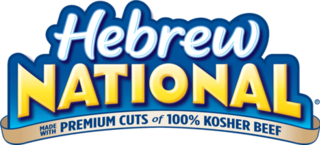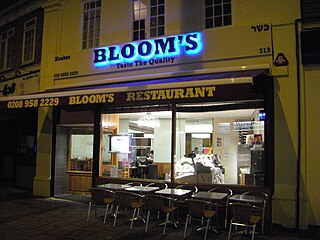Kashrut is a set of dietary laws dealing with the foods that Jewish people are permitted to eat and how those foods must be prepared according to Jewish law. Food that may be consumed is deemed kosher, from the Ashkenazi pronunciation of the term that in Sephardic or Modern Hebrew is pronounced kashér, meaning "fit".
Kosher is food that may be consumed according to kashrut, or Jewish dietary laws.
Jew Watch was an antisemitic website promoting Holocaust denial and negative claims about Jews. The claims included allegations of a conspiracy that Jews control the media and banking, as well as accusations of Jewish involvement in terrorist groups. The site contained propaganda, according to Sam Varghese of The Age, similar to that used in Nazi Germany. It was widely considered a hate site. Jew Watch received support from Stormfront, a white nationalist and neo-Nazi site. The site described itself as a "not-for-profit library for private study, scholarship, or research [that keeps] a close watch on Jewish Communities and organizations worldwide".
A hechsher is a rabbinical product certification, qualifying items that conform to the requirements of Jewish religious law.
Kosher foods are foods that conform to the Jewish dietary regulations of kashrut. The laws of kashrut apply to food derived from living creatures and kosher foods are restricted to certain types of mammals, birds and fish meeting specific criteria; the flesh of any animals that do not meet these criteria is forbidden by the dietary laws. Furthermore, kosher mammals and birds must be slaughtered according to a process known as shechita and their blood may never be consumed and must be removed from the meat by a process of salting and soaking in water for the meat to be permissible for use. All plant-based products, including fruits, vegetables, grains, herbs and spices, are intrinsically kosher, although certain produce grown in the Land of Israel is subjected to other requirements, such as tithing, before it may be consumed.

The Orthodox Union is one of the largest Orthodox Jewish organizations in the United States. Founded in 1898, the OU supports a network of synagogues, youth programs, Jewish and Religious Zionist advocacy programs, programs for the disabled, localized religious study programs, and international units with locations in Israel and formerly in Ukraine. The OU maintains a kosher certification service, whose circled-U hechsher symbol, U+24CAⓊ, is found on the labels of many kosher commercial and consumer food products.

Hebrew National is a brand of kosher hot dogs and sausages made by ConAgra Foods. In 1982, Hebrew National opened a non-kosher division under the name National Deli; it was sold off in 2001, and is now based in Florida.

OK Kosher Certification is a major kosher certification agency based out of Brooklyn, NY. It is one of the "Big Five," the five largest kosher certifying agencies in the United States. OK also has a large kosher presence in Asia.

Kosher style refers to foods commonly associated with Jewish cuisine but which may or may not actually be kosher. It is a stylistic designation rather than one based on the laws of kashrut. Generally, kosher-style food does not include meat from forbidden animals, such as pigs and shellfish, and does not contain both meat and milk in the same dish; however if such dish includes meat, it might not be kosher slaughtered. In some U.S. states, the use of this term in advertising is illegal as a misleading term under consumer protection laws.
The Islamic dietary laws (halal) and the Jewish dietary laws are both quite detailed, and contain both points of similarity and discord. Both are the dietary laws and described in distinct religious texts: an explanation of the Islamic code of law found in the Quran and Sunnah and the Jewish code of laws found in the Torah, Talmud and Shulchan Aruch.
Antisemitic tropes or antisemitic canards are "sensational reports, misrepresentations, or fabrications" that are defamatory towards Judaism as a religion or defamatory towards Jews as an ethnic or religious group. Since the Middle Ages, such reports have been a recurring motif of broader antisemitic conspiracy theories.
Magen Tzedek, originally known as Hekhsher Tzedek, is a complementary certification for kosher food produced in the United States in a way that meets Jewish Halakhic (legal) standards for workers, consumers, animals, and the environment, as understood by Conservative Judaism. Magen Tzedek certification is not a kashrut certification which certifies that food is kosher in that it meets certain requirements regarding ingredients of food and technical methods of animal slaughter, but an ethical certification complementary to conventional kosher certification.

A kosher restaurant or kosher deli is an establishment that serves food that complies with Jewish dietary laws (kashrut). These businesses, which also include diners, cafés, pizzerias, fast food, and cafeterias, and are frequently in listings together with kosher bakeries, butchers, caterers, and other similar places, differ from kosher-style businesses in that they operate under rabbinical supervision, which requires that the laws of kashrut, as well as certain other Jewish laws, including the separation of meat and dairy must be observed.
Civil laws regarding kashrut are found in several countries. Advertising standards laws in many jurisdictions prohibit the use of the phrase "kosher" in a product's labelling, unless it can be shown that the product conforms to Jewish dietary laws; however, the legal qualifications for conforming to Jewish dietary laws are often defined differently in different jurisdictions.
Antisemitism in Canada is the manifestation of hostility, prejudice or discrimination against the Canadian Jewish people or Judaism as a religious, ethnic or racial group. This form of racism has affected Jews since Canada's Jewish community was established in the 18th century.
Anti-Jewish boycotts are organized boycotts directed against Jewish people to exclude them economical, political or cultural life. Antisemitic boycotts are often regarded as a manifestation of popular antisemitism.
A kosher certification agency is an organization or certifying authority that grants a hechsher to ingredients, packaged foods, beverages, and certain materials, as well as food-service providers and facilities in which kosher food is prepared or served. This certification verifies that the ingredients, production process including all machinery, and/or food-service process complies with the standards of kashrut as stipulated in the Shulchan Arukh, the benchmark of religious Jewish law. The certification agency employs mashgichim to make periodic site visits and oversee the food-production or food-service process in order to verify ongoing compliance. Each agency has its own trademarked symbol that it allows manufacturers and food-service providers to display on their products or in-store certificates; use of this symbol can be revoked for non-compliance. Each agency typically has a "certifying rabbi" who determines the exact kashrut standards to be applied and oversees their implementation.
The Jewish-American patronage of Chinese restaurants became prominent in the 20th century, especially among Jewish New Yorkers. It has received attention as a paradoxical form of assimilation by embracing an unfamiliar cuisine that eased the consumption of non-kosher foods.
Criticism of kashrut is criticism of or opposition to the laws of kashrut and/or dislike of kosher foods. Criticism of kashrut can either come from non-Jews or it can come from Jews who don't keep kosher, and it may or may not be motivated by antisemitism. In some European countries, kosher slaughter is either banned or restricted by law, often because nationalists or animal rights activists object to the practice. Certain aspects of kashrut have been alleged to promote sectarianism or racism, a claim that is rejected by Jews who keep kosher. Right-wing extremists sometimes criticize kashrut due to their belief in antisemitic canards and antisemitic conspiracy theories. In Classical Reform Judaism, the keeping of kosher has been discouraged, based on its belief that the keeping of Kosher is an unhelpful vestige of the past. In the Soviet Union, the keeping of Kosher was discouraged, due to the anti-religious and antisemitic policies of the Soviet government, and the anti-religious views of secular Jewish Communists.

Halal conspiracy theories revolve around a series of Islamophobic conspiracy theories and hoaxes regarding halal certification in products such as food, beverages and cosmetics. The claims usually made include that the sale of halal-certified goods in stores is a precursor to the Islamization or institution of Sharia law in a non-Muslim country, that the fees paid by companies for halal certification fund Islamic terrorism, that halal slaughter for meat is cruel, unhygienic or constitutes as animal sacrifice, among others. The spread of these claims has resulted in boycotts and harassment campaigns against businesses who sell halal-certified products, most notably in Australia and India, although anti-halal boycott movements also exist in Denmark, France, Canada, New Zealand, the United Kingdom and the United States.







